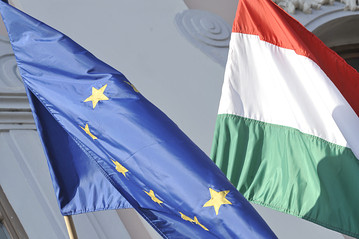Hungary: “Test case” for EU democracy?

A thorough bit of analysis on Hungary and its recent “palpable erosion of democracy” was published this morning by US-based think tank The Foreign Policy Research Institute which deems the country to represent a full-on “test of the European Union’s ability to prevent” said erosion.
Within the 3,000-plus word document, the authors question the EU’s very legitimacy itself and suggest that, due to the Orbán government’s legislative machinations, the entry of new member state Croatia into the union will only increase Union economic instability and its attempted protection of democratic ideals.
The analysts who drafted the report, Alexandra Wiktorek Sarlo and Maia Otarashvili, reckon that Hungary’s present-day woes can ultimately be attributed to the failure of the government back in the late 1980s/early 90s to formulate a solid constitutional framework, a failure that resulted in 23 changes to the national constitution in 20 years. The combination of “grim” economic outlook and the Orbán government’s power grab during the prime minister’s second turn in office may finally have to be addressed by the United States working in tandem with EU authorities to preserve democracy on The Continent.
Excerpts from “Can the EU Rescue Democracy in Hungary?” follow; the entire report may be found via the previous link.
• “With a two-thirds majority in parliament, Orbán’s Fidesz party pushed through a new constitution, the Fundamental Law (in effect since January 2012). The Fundamental Law solidifies the power of the ruling party on several key fronts. It weakens the Constitutional Court, harms the free press, makes political dissent in Hungary more difficult, and promotes nationalist values that encourage far-right elements at the expense of minorities.”
• “The crisis over the Hungarian constitution originates in the government’s failure to write a new constitution after Hungary’s communist regime fell in 1989. The current government has, in turn, used the constitution as a power grab while claiming to be completing the de-communization process. Meanwhile, the roots of Orbán’s current popularity and political platform rest in his first-term [1998-2002] policies, as well as the incompetence of previous leaders.”
• “Economically, Orbán’s first term was generally successful, despite criticism of his government’s efforts to combat corruption and inflation. His major accomplishments included implementation of health, education and agricultural reforms, as well as stabilization of the economy. Economic conditions appeared promising enough that some hoped Hungary would join the Eurozone by 2009.”
• “Recently, the radical right-wing party Jobbik—the third-largest party in Parliament—has also grown in influence. Orbán’s failure to control Jobbik and his defiant attitude against the EU, combined with the new constitution’s nationalist elements, play into Jobbik’s ultranationalist agenda.”
• “Although the EU Parliament recently voted in favor of the Tavares Report, which calls for greater scrutiny of Hungary and for the establishment of a new EU body to monitor member states’ compliance with EU values, significant dissent came from the center-right bloc. From this perspective, the left-leaning elements of the EU Parliament who have been critical of Hungary are guilty of holding double standards: strict for Hungary, and more lax for Socialist-leaning Bulgaria and Romania.”
• “During the time of the unsuccessful aid negotiations with international financial institutions, Orbán and his Fidesz confidant [György] Matolcsy, the former Minister of Economy and current head of the Central Bank, had been pursuing what Orbán called ‘economic self-rule.’ Their attempt to bypass the Constitutional Court by narrowing its scale of competence to review and annul most unconstitutional budgetary measures has garnered some of the boldest criticism in the Venice Commission’s June 2013 report: it “results in reducing the position of the Constitutional Court as guarantor of the Fundamental Law and its principles, which include European standards of democracy, the protection of human rights and the rule of law.”
• “Crafting a united EU response to Hungary’s troubles might be difficult, but individual states and groups of states could work with the Hungarian government to ensure that no further erosion of democracy occurs. One such group is the Visegrad 4 ... Now that they are full-fledged EU members, these states are eager to establish themselves as equal participants in EU policy-making and to distinguish themselves as credible democratizers outside the EU. Thus the three other Visegrad countries might have the potential to persuade Orbán and Fidesz to compromise. This would both keep the reputation of the alliance strong, and benefit democratic politics in Hungary.”
• “Hungary’s current economic outlook is grim. Exports, consumption, investments and overall GDP growth are expected to continue to stagnate while government debt is expected to stay at almost 80% of GDP (the highest among the EU’s post-communist member states) along with gross external debt at 121 percent of GDP, and unsustainably high borrowing costs on government bonds.”
• “…the United States should work actively with its European allies to counteract the democratic deterioration in Hungary through financial leverage, external pressure and talks with the Hungarian leadership. Failure to do so may result in the further spread of skepticism towards the West, a greater role for ethno-nationalist politics, and increased disregard for democratic principles in the newer EU states and the non-EU former Soviet states.”
SUPPORT THE BUDAPEST BUSINESS JOURNAL
Producing journalism that is worthy of the name is a costly business. For 27 years, the publishers, editors and reporters of the Budapest Business Journal have striven to bring you business news that works, information that you can trust, that is factual, accurate and presented without fear or favor.
Newspaper organizations across the globe have struggled to find a business model that allows them to continue to excel, without compromising their ability to perform. Most recently, some have experimented with the idea of involving their most important stakeholders, their readers.
We would like to offer that same opportunity to our readers. We would like to invite you to help us deliver the quality business journalism you require. Hit our Support the BBJ button and you can choose the how much and how often you send us your contributions.









